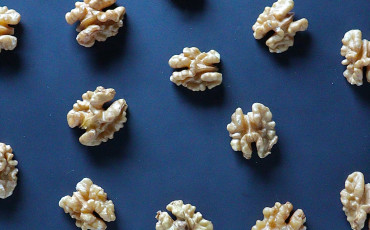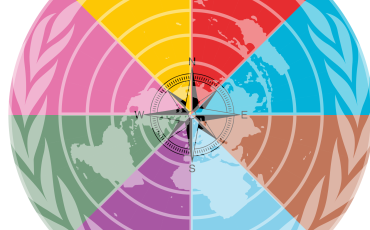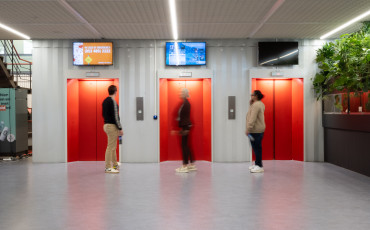By Jocelyn Manderveld & Aukje Leufkens
EDUiLAB is the driving force behind educational innovation within Tilburg University. With its mission to help lecturers to develop, implement and evaluate novel teaching methods, which, in turn, lead to effective, cutting-edge learning experiences. Over the course of the last year, EDUiLAB has experimented hand-in-hand with lecturers, offering tailor-made material, individual consultations, scalable training, and micro credential programs for students, to name only a few of their initiatives.
This, in turn, has allowed EDUiLAB to collect data on multiple enriching learning experiences as well as generate some key take-away messages. Specifically, we found that COVID-19 offered a unique opportunity to place an experimental approach at the forefront of our ongoing efforts to establish an innovative educational culture. On the basis of our experience, we have formulated three core conditions which are necessary to sustain educational innovation:
- Organizing a combination of top-down and bottom-up educational innovation activities
- Providing lecturers with sufficient support
- Ensuring knowledge sharing and community building
The transformation towards structural educational innovation
When EDUiLAB started in 2018, there was no real educational innovation culture within Tilburg University. Small-scale educational innovation projects were running within different schools, and several lecturers were experimenting with innovative forms of teaching. Still, the University was primarily known for its excellent small-scale education on campus, where lecturers both design and implement the education together with program directors. Notwithstanding these initiatives, there was no indication of structural educational innovation within Tilburg University at that juncture. Therefore, in the first few years, EDUiLAB built on pre-existing projects carried out within the faculties.
However, everything changed in March 2020 as a result of the COVID-19 pandemic and attendant measures. Tilburg University's education underwent a profound transformation, in part due to the shift to online teaching, which required instructors to utilize a wider variety of learning goals, learning activities, and work formats. Indeed, on several occasions, lecturers were forced to redesign their courses and assessments as they went along in order to keep up with the continually evolving circumstances.
This situation demanded considerable effort from our teaching staff who were forced to adapt to a new educational situation in an incredibly short space of time. In light of this, it became vitally important that the University provides the necessary conditions for a more structural and sustainable form of educational innovation to take place. EDUiLAB together with the schools provided the necessary conditions to initiate a more sustainable innovative turn within Tilburg University’s education. What specific activities did we undertake?
Organizing a mixture of top-down and bottom-up educational innovation activities
A bottom-up approach begins with the teacher. The advantage of this approach is that educational innovation arises out of lecturers’ own enthusiasm and corresponds to their priorities.
A top-down approach begins with making agreements with the educational programs. This top-down approach has the advantage of creating movement more quickly and, therefore, allowing you to take the next step sooner. Setting up a support infrastructure is easier if you are assured that almost everyone will use it.
Within EDUiLAB, a mixture of top-down and bottom-up activities were utilized in order to combine the respective strengths of both strategies. During the summer of 2020, the ‘Innovate your education’ initiative was launched. This initiative allows lecturers to attain a grant by writing a proposal about how they would like to innovate within their education. This initiative is a combination of a top-down and bottom-up approach. The program and finances were arranged at the central University level (top-down), while the initiatives come from lecturers themselves (bottom-up). Thus far, 20 proposals have been accepted across the five different schools at Tilburg University.
Providing teacher support
A Teacher Desk was created at Tilburg University for the express purpose of providing lecturers with support. As a result of the COVID-19 pandemic, lecturers quickly had to shift to online education, which involved a lot of questions regarding the new forms of education (online, blended, hybrid). The Teacher Desk helps to resolve all different types of questions about online, blended and hybrid teaching. This support is greatly appreciated by lecturers and continues to be requested by them. After the positive experiences with the Teacher Desk, it has become a structural part of the Tilburg University organization.
Ensuring knowledge sharing and community building
Another important element is the formation of communities within an institution of lecturers who are engaged in educational innovation. These communities allow lecturers to exchange knowledge with one another, as opposed to having to reinvent the wheel time and time again. EDUiLAB is the lynchpin between the schools, as it aims to disseminate the knowledge gained within each school.
One way to disseminate this knowledge is our Innovation Board, a monthly meeting with all innovation coordinators. During this meeting the schools share new developments and experiences, and collective projects are initiated. Furthermore, several activities have been organized to foster this sense of community and inspire lecturers, such as teaching meetings, webinars and innovation days. These teaching meetings are organized according to the principle of for lecturers by lecturers, and involves lecturers sharing their experiences of education. Communication and knowledge sharing are of paramount importance for supporting lecturers.
The upcoming challenge is to hold on to these changes, while, simultaneously, expanding the educational innovation culture at Tilburg University.
This article is a short edit from publication in Tilburg Series in Academic Education.
Foto door Dan Dennis
via Unsplash



0 Praat mee